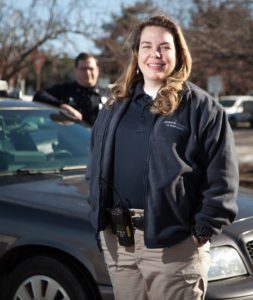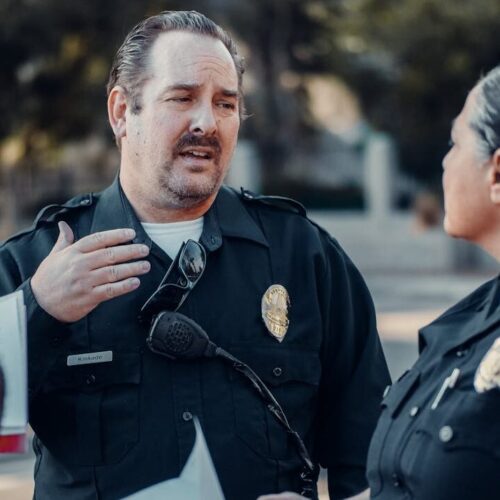Officers, Co-Responder Seek to Employ ‘Right Intervention’ for People with Mental Illnesses in Overland Park, KS
 When Megan Younger (pictured right) got the call to join police officers conducting a welfare check at the home of a woman who had spent the last three days in her bathtub, rendered immobile by her psychosis, she ran through all the evening’s possible outcomes in her head.
When Megan Younger (pictured right) got the call to join police officers conducting a welfare check at the home of a woman who had spent the last three days in her bathtub, rendered immobile by her psychosis, she ran through all the evening’s possible outcomes in her head.
“If I’d been a clinician answering a call on the crisis line, I would’ve told the officers, ‘Bring this woman to the emergency room for assessment immediately,’” Younger said. “They likely would’ve had to bring her in against her will and subject her to the trauma of being removed from her home.”
But, in person, the scene unfolded very differently.
As the mental health co-responder working with the Overland Park Police Department (OPPD) in Johnson County, Kansas, Younger entered the woman’s home and found it immaculately maintained—she had food and clean clothes, her pets were well-taken-care-of, and her medication was diligently laid out. She had even gotten herself out of the bathtub in the time it took officers to respond to the call. To Younger, there were no signs that a major intervention was needed.
Here she saw an opportunity to avoid an emergency room visit. So Younger stayed with the woman for hours, providing support and eventually getting her to eat and take her medication. The next morning, Younger contacted the woman’s family and arranged for a member of the Johnson County Mental Health mobile crisis unit to check in on her. The result: emergency room and law enforcement hours saved, a benefit which Younger sees as important, but secondary to her main goal of providing community members who have mental health and substance use disorders with the care they need.
“The key is being in people’s homes, being out in the community, being in the grocery stores and parking lots, at the gas station,” Younger said. “Wherever that person is in that moment, that’s where I’m going to meet officers and we’re going to figure out what to do to get them the appropriate care. Having clinical eyes on scene is what makes this program work.”
“The right intervention at the right time”
Younger, a social worker with 16 years of experience in emergency mental health services, has been the designated co-responder embedded in the OPPD since May 2014, a position made possible by a Bureau of Justice Assistance (BJA) Justice and Mental Health Collaboration Program (JMHCP) grant awarded to the City of Overland Park in 2013.
“Megan was the perfect choice,” said OPPD Sergeant Todd George. “She became an integral part of the police department quickly. In my mind, that’s the key—the ability of the co-responder to be a part of the department at the line officer level, where she can build and maintain those relationships.”
To showcase the effects of the co-responder model in Overland Park, Johnson County Mental Health and OPPD collected data on the 1,093 calls for service involving someone having a mental health crisis that Younger was involved with between May 2014 and October 2015. In response to those contacts, just 22 arrests were made, while 41 arrests were avoided. Additionally, 41 people were taken to the emergency room, while 56 were kept out of the emergency room and instead assisted on scene, often with the Johnson County Mental Health mobile crisis unit following up with them at a later date.
Additionally, in a survey conducted in May 2014 before the implementation of the co-responder model and then again in October 2015, OPPD officers’ confidence in the department’s effectiveness at keeping people with mental disorders out of jail increased 19 percent. Thirty-five percent of officers felt very well prepared to deal with people with mental disorders, up from 22 percent before the implementation of the co-responder model.
Rob MacDougall—a licensed master social worker at Johnson County Mental Health who was involved with the implementation of the co-responder model in Overland Park and the neighboring city of Olathe—believes Overland Park’s success with its program has a lot to do with the level of trust that exists between Younger and the officers.
“It takes time, but as officers at the department understand her role and what the co-responder can and can’t do, they come to respect and trust the clinical judgment of the co-responder,” MacDougall said. “It’s all about executing the right intervention at the right time.”
“An education with every officer, every time”
To support Younger’s work and increase public safety, OPPD aims to keep two-thirds of its force trained in Crisis Intervention Team (CIT) practices—a first-responder model of police-based crisis intervention that incorporates partnerships with community advocates and health care organizations, among others.
Currently, OPPD has put more than 1,000 officers through the 40-hour CIT training course led by OPPD’s CIT coordinator, Tom Keary.
“Sometimes on the front end officers are skeptical, but then they spend a day or so in the class and realize the value it brings,” George said. “It gives officers the ability to look at things from another perspective and get a better understanding of just how to deal with people who are suffering from mental illness. It’s another tool in the toolbox of how to handle our calls for service.”
Having CIT-trained officers allows for more effective collaboration, according to Younger, who said her relationships at the police station are equal parts teaching and learning.
“If I tell officers that we need to take someone to the emergency room and we end up waiting for six or eight hours, I’m going to stay with them the whole time and walk them through everything I’m doing,” Younger said. “I trust their judgment when it comes to safety, and they trust my clinical judgment. It’s like an education with every officer, every time.”
The sharp rise in school shootings over the past 25 years has led school officials across the U.S.…
Read MoreA three-digit crisis line, 988, launched two years ago to supplement—not necessarily replace—911. Calling 988 simplifies access to…
Read MoreIt would hardly be controversial to expect an ambulance to arrive if someone called 911 for a physical…
Read More Taking the HEAT Out of Campus Crises: A Proactive Approach to College Safety
Taking the HEAT Out of Campus Crises: A Proactive Approach to College Safety
The sharp rise in school shootings over the past 25 years has…
Read More From 911 to 988: Salt Lake City’s Innovative Dispatch Diversion Program Gives More Crisis Options
From 911 to 988: Salt Lake City’s Innovative Dispatch Diversion Program Gives More Crisis Options
A three-digit crisis line, 988, launched two years ago to supplement—not necessarily…
Read More Matching Care to Need: 5 Facts on How to Improve Behavioral Health Crisis Response
Matching Care to Need: 5 Facts on How to Improve Behavioral Health Crisis Response
It would hardly be controversial to expect an ambulance to arrive if…
Read More











